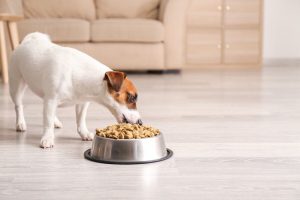Why does my dog have diarrhea?
Dog diarrhea is caused for numerous reasons including stress. Common stressful situations that can trigger gastrointestinal (GI) upset in a dog include adoption, boarding, separation anxiety from their owner, changes in the household or environment and introduction of a new pet or family member.
Another frequent cause of diarrhea in dogs can be abrupt changes in diet without a transition period. Purina has recommendations for switching your dog’s food here.
Sometimes a dog’s diarrhea, as well as vomiting, can be caused by ingestion of human food or garbage. In these cases, especially if your dog has diarrhea, vomiting or bloody diarrhea it is strongly recommended that you call a veterinarian immediately- Find a Veterinary Clinic Near You
- Has your dog experienced a stressful event recently?
- Has your dog been alone for a longer amount of time than they are used to?
- Have you switched your dog’s food recently?
- Has your dog been into garbage or eaten something inconsistent with their normal diet?
- Did your dog drink water that could have been contaminated with bacteria from a puddle or a stagnant pond?
What can I give my dog for diarrhea?
Can I give my dog probiotics? Though diarrhea may be short-term, they still run the risk of becoming dangerously dehydrated. Make sure to provide plenty of fresh, clean water to your dog while maintaining a consistent feeding schedule with a probiotic. You’ll find it will do much to repopulate your dog’s healthy gut bacteria.
When your dog feels anxious or upset, they can experience acute, short-term diarrhea. Here, again, a probiotic supplement can be used to calm your dog’s digestive tract and promote colonization of good bacteria to help maintain microbial balance in the intestine.
Learn more about canine stress diarrhea in dogs by visiting your Veterinarian and ask your veterinarian about Pro Plan® Veterinary® Diets FortiFlora®.
What to feed a dog with diarrhea?
If your dog experiences diarrhea frequently, they may have dietary sensitivities that should be examined by your veterinarian. In addition to a canine probiotic, many veterinarians prescribe a highly digestible prescription dog food formula. Ask your veterinarian about Veterinary Diets.
How to care for your dog when they have diarrhea:
If possible, prevent stress in your dog by easing them through social, dietary or other life transitions and let them acclimate to new experiences gradually. Many veterinarians recommend a probiotic supplement, which supplies beneficial bacteria to repopulate your dog’s healthy gut bacteria. It can also be used when a stressful situation is anticipated to help keep your pet’s digestive tract in check pre-emptively. Be sure to provide your dog with plenty of clean water to keep them hydrated.





